Dive into the enchanting world of Cavalier King Charles Spaniels – a breed of dogs cherished globally for their gentle disposition, adorable aesthetics, and impressive adaptability. This comprehensive guide is a reliable touchstone for understanding their distinctive personality traits, grooming requirements, breed characteristics, and training approaches. If you’re contemplating whether to welcome this small yet spirited breed into your family or if you’re an existing owner aiming to optimize your pet care, this article will offer an invaluable resource packed with in-depth insights and practical advice. Learn about the Cavaliers’ captivating traits, ranging from their generous nature and intelligent minds to their vibrant coat colors and versatile compatibility with varied living environments.

Table of Contents
- 1 Understanding the Personality Traits
- 2 Breed Characteristics and Care Requirements
- 3 Training and Grooming for Cavaliers
- 4 Health Concerns and Lifelong Care
- 5 Compatibility with Children and Other Pets
- 6 Apartment Living and Exercise Needs
- 7 Key Takeaways on Cavalier King Charles Spaniel Temperament
- 8 Related posts:
- 9 Black Tan Cavalier King Charles Spaniel: Facts & Photos
- 10 Why Cavalier King Charles Spaniels Make Great Emotional Support Animals
- 11 Tricolor Cavalier King Charles Spaniel: Ultimate Guide & Care Tips
- 12 10 Things You Didn't Know About Cavalier King Charles Spaniels
Understanding the Personality Traits
Cavalier King Charles Spaniels are known for their gentle and patient temperament, making them a popular choice for families and individuals. Their calm demeanor is one of their most endearing traits, as they are rarely aggressive or easily agitated. This breed’s friendly nature makes them great companions for people of all ages.
These King Charles Spaniels, also known as Toy Spaniels, are highly sociable and thrive on human interaction. They love being around their owners and often seek attention and affection. Cavalier breeders find them eager to please, which makes training them relatively easy compared to other breeds. They respond well to positive reinforcement techniques and enjoy learning new tricks and commands.
However, it’s important to note that cavaliers can be prone to separation anxiet if left alone for long periods. Due to their strong bond with their owners, they may become anxious or distressed when separated. It is crucial to provide them with plenty of mental stimulation and exercise before leaving them alone for extended periods.
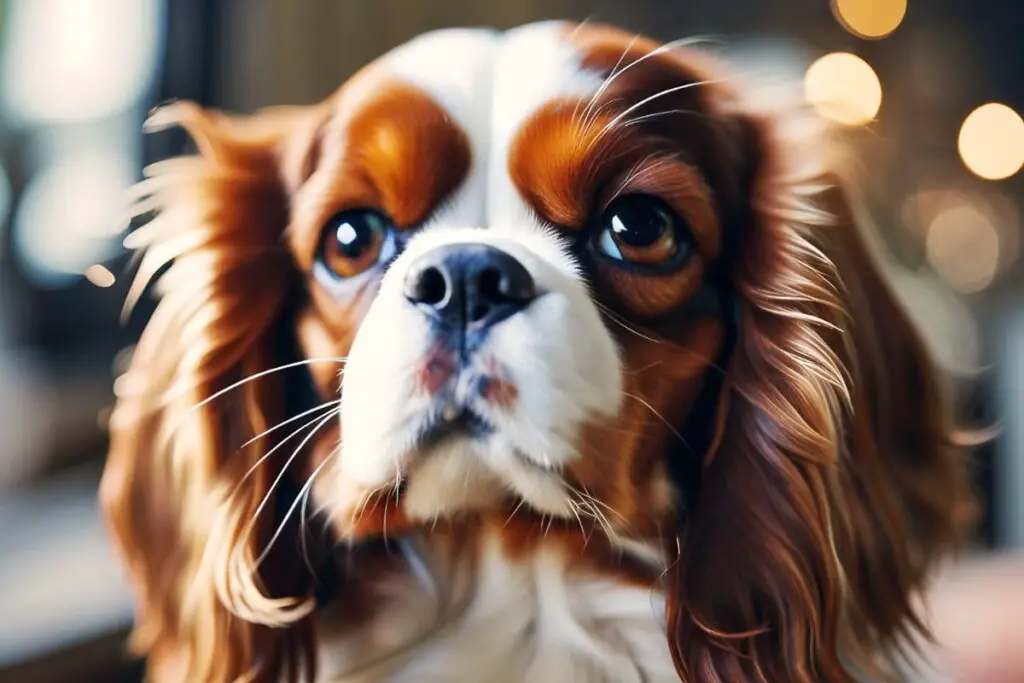
Regarding appearance, the Cavalier King Charles Spaniel is known for its adorable face, capturing the hearts of dog lovers. Their expressive eyes and long ears make them look sweet and innocent. This breed comes in four coat colors: Blenheim, Tricolor, Black & Tan, and Ruby, adding to their charm.
King Charles Spaniel puppies have a pleasant temperament partly due to careful breeding practices over generations. Breeders have focused on selecting toy dogs with desirable personality traits while prioritizing health factors. As a result, these puppies tend to have fewer behavioral issues than other breeds.
Breed Characteristics and Care Requirements
Cavalier King Charles Spaniels are small-sized dogs known for their adorable appearance and friendly temperament. With their silky, medium-length coats and expressive eyes, they capture the hearts of dog lovers everywhere.
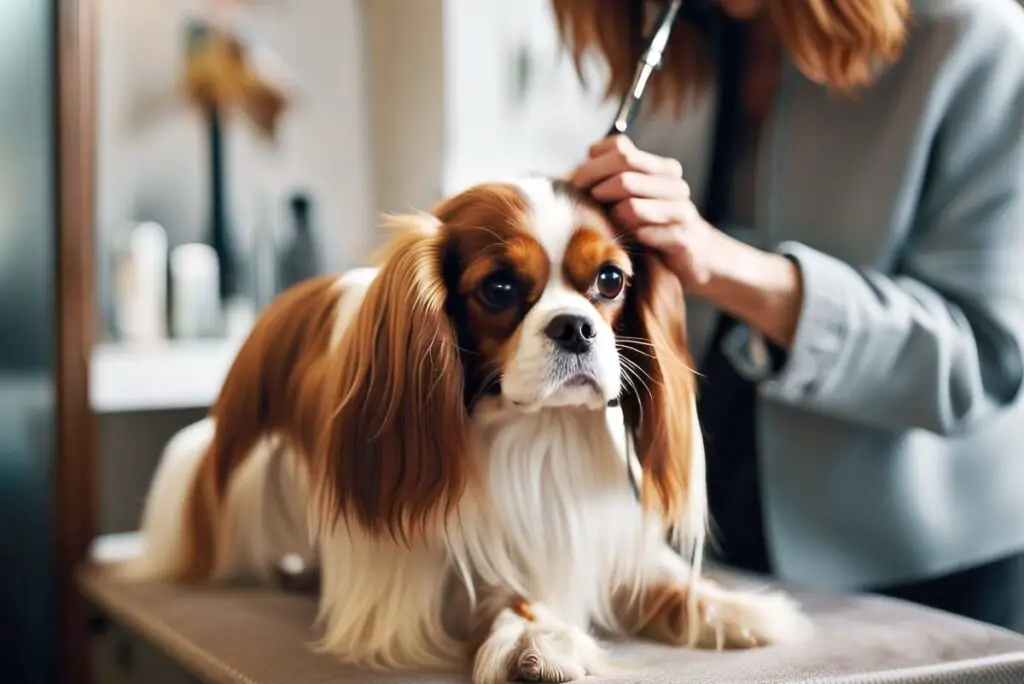
Silky Coats that Require Regular Grooming
One of the distinguishing features of Cavalier King Charles Spaniels is their beautiful coat. It is important to note that their fur requires regular grooming to maintain its health and appearance. The medium-length hair tends to tangle easily, so daily brushing is recommended to prevent matting. These dogs shed moderately, so frequent brushing helps minimize loose hair around the house.
Moderate Exercise Needs for a Happy Spaniel
While Cavalier King Charles Spaniels are energetic little dogs, they do not have high exercise requirements like some larger breeds. Daily walks and playtime sessions are usually sufficient to keep them happy and healthy. These activities provide mental stimulation and physical exercise for your furry companion. Engaging in interactive games or agility training can also help keep them mentally sharp.
Toy Breeds with Big Personalities
Cavaliers belong to the toy breed category but possess prominent personalities that make them stand out among other small dogs. They are known for being affectionate, gentle, and eager to please their owners. Their friendly nature makes them excellent companions for families with children or individuals looking for a loyal pet.
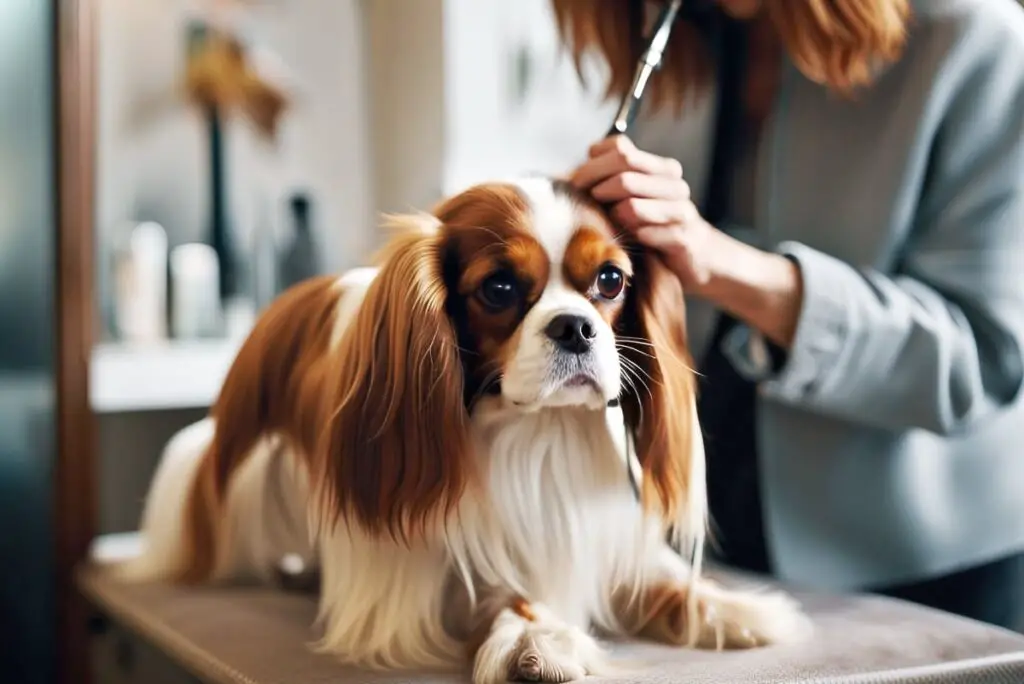
Floppy Ears and Health Concerns
One characteristic that defines Cavalier King Charles Spaniels is their adorable floppy ears. These long ears contribute to their charming appearance but require special attention. Regular ear cleaning is essential to prevent infections caused by trapped moisture or debris.
It’s important to note that Cavaliers may be prone to certain health conditions due to their breeding history. This breed’s heart conditions, such as mitral valve disease, are relatively common. Regular veterinary check-ups and a balanced diet can help manage these potential health issues.
Size and Color Variations
Cavalier King Charles Spaniels typically weigh between 13 to 18 pounds (5.9 to 8.2 kilograms) and stand about 12 to 13 inches (30 to 33 centimeters) tall at the shoulder. They come in various colors, including Blenheim (chestnut markings on a white background), Tricolor (black and white with tan markings), Black and Tan, and Ruby (solid red).
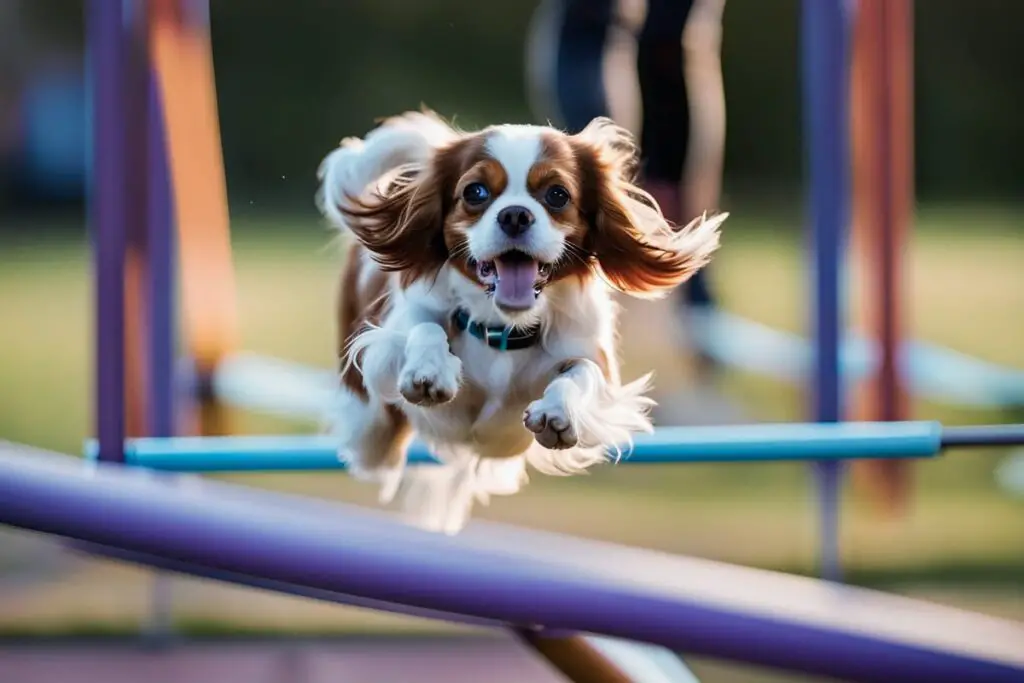
Finding a Responsible Breeder
If you’re considering adding a Cavalier King Charles Spaniel to your family, it’s crucial to find a reputable breeder who prioritizes the health and well-being of their dogs. Look for breeders who conduct health screenings on their breeding stock to reduce the risk of inherited diseases.
Training and Grooming for Cavaliers
Cavaliers are known for their friendly and affectionate nature, but like any dog, they require proper training and grooming to ensure they are happy and healthy. Here are some essential factors to consider.
Positive Reinforcement Training Methods
Cavaliers respond well to positive reinforcement training methods. This means using rewards such as treats, praise, and playtime to encourage good behavior. Harsh or punitive training techniques can harm their sensitive temperament, so focusing on positive reinforcement is best. Cavaliers are intelligent dogs that love to please their owners, making them eager learners during training sessions.
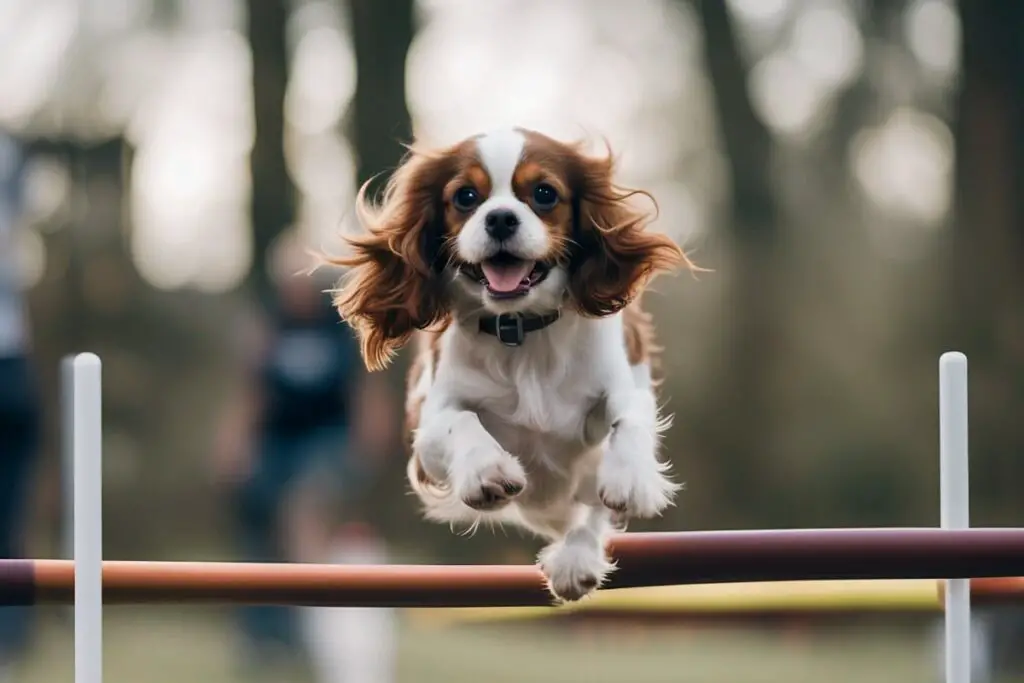
Early Socialization
Consistent socialization from an early age is crucial. Exposure to various people, animals, sounds, and environments helps them become well-rounded adults. Take your Cavalier on walks in different neighborhoods, introduce them to other dogs at the park, and invite friends over for visits. The more experiences they have as puppies, the better equipped they will handle new situations.
Regular Grooming Routine
Cavaliers have beautiful coats with feathered ears and tails that require regular grooming. Establishing a routine early on will help keep their silky skin looking its best. Brushing your Cavalier’s coat two to three times a week will help prevent matting and keep it shiny. Pay special attention to the feathered areas around the ears, legs, chest, and tail.
In addition to brushing their coat regularly, you should also maintain good dental hygiene by brushing their teeth several times a week. This helps prevent dental issues such as gum disease or tooth decay.
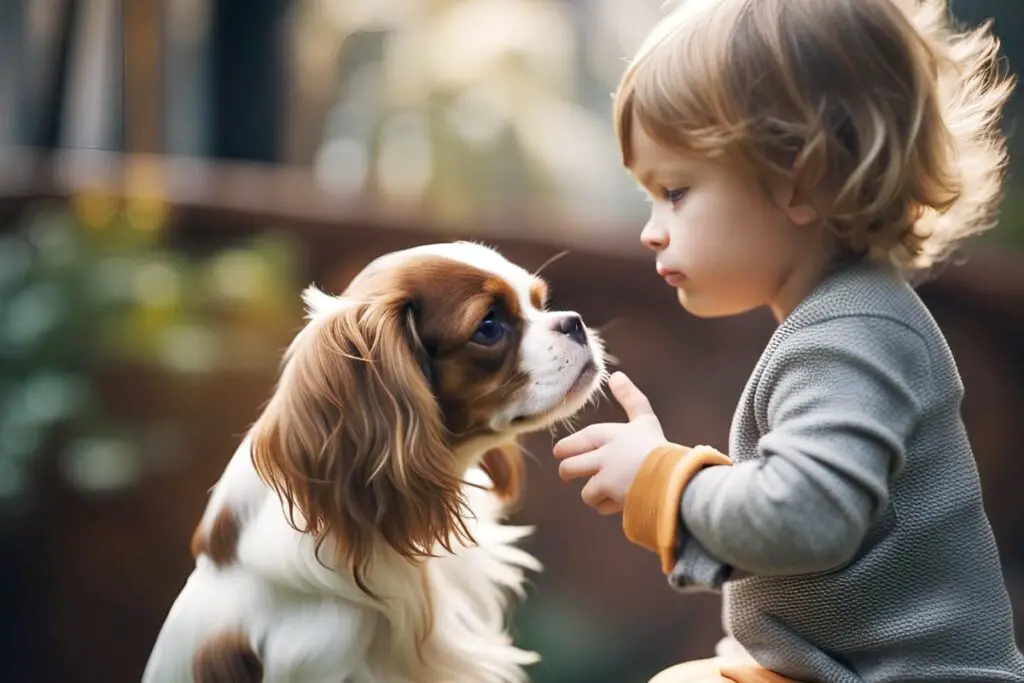
Professional Grooming Services
While regular home grooming is essential for Cavaliers’ overall well-being, occasional professional grooming services can also be beneficial. Professional groomers have the expertise to trim your Cavalier’s nails, clean their ears, and give them a thorough bath. They can also offer advice on specific grooming techniques for Cavaliers, ensuring they look and feel their best.
Breed-Specific Grooming Considerations
Cavaliers have long, silky coats that require special attention. Here are some breed-specific grooming considerations to keep in mind:
- Use a slicker brush or comb to remove any tangles or knots from their coat gently.
- Trim the hair around their paws regularly to prevent discomfort and matting.
- Check their ears regularly for signs of infection or excessive wax buildup. Clean them with a veterinarian-approved ear cleaner as needed.
- Consider using a detangling spray before brushing to make the process easier and more comfortable for your Cavalier.
Following these training and grooming tips ensures that your Cavalier King Charles Spaniel remains happy, healthy, and well-behaved. Remember, consistency is critical. Your Cavalier will thrive as a cherished family member.
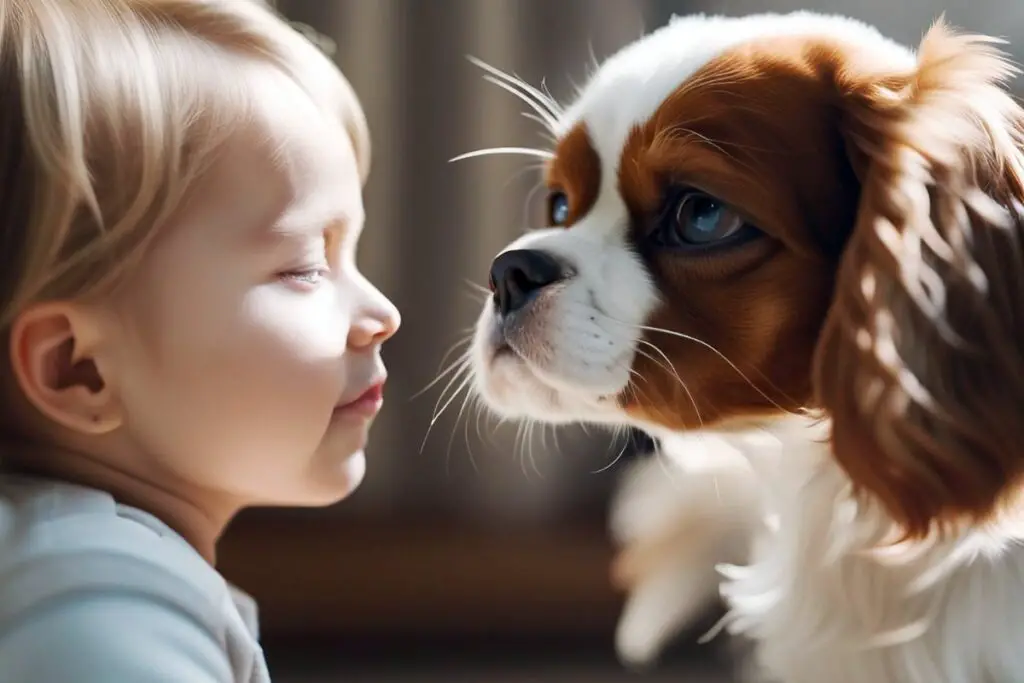
So whether you’re teaching them new tricks or keeping their coat looking pristine, investing time in training and grooming will strengthen the bond between you and your furry friend while promoting their overall well-being.
Health Concerns and Lifelong Care
Cavalier King Charles Spaniels are beloved pets known for their friendly disposition and affectionate nature. However, like any breed, they have specific health concerns that require special attention and lifelong care.
One of the most significant health issues affecting Cavalier King Charles Spaniels is mitral valve disease, which affects the heart. This disease occurs when the mitral valve, responsible for regulating blood flow in the heart, becomes weak or damaged over time. Sadly, mitral valve disease is prevalent among this breed, with many Cavaliers developing it as they age.
In addition to heart conditions, Cavaliers are prone to various eye problems. These can range from minor issues such as dry eyes to more severe conditions like cataracts or progressive retinal atrophy. Regular veterinary check-ups are crucial for early detection of these eye problems so that appropriate treatment can be administered promptly.
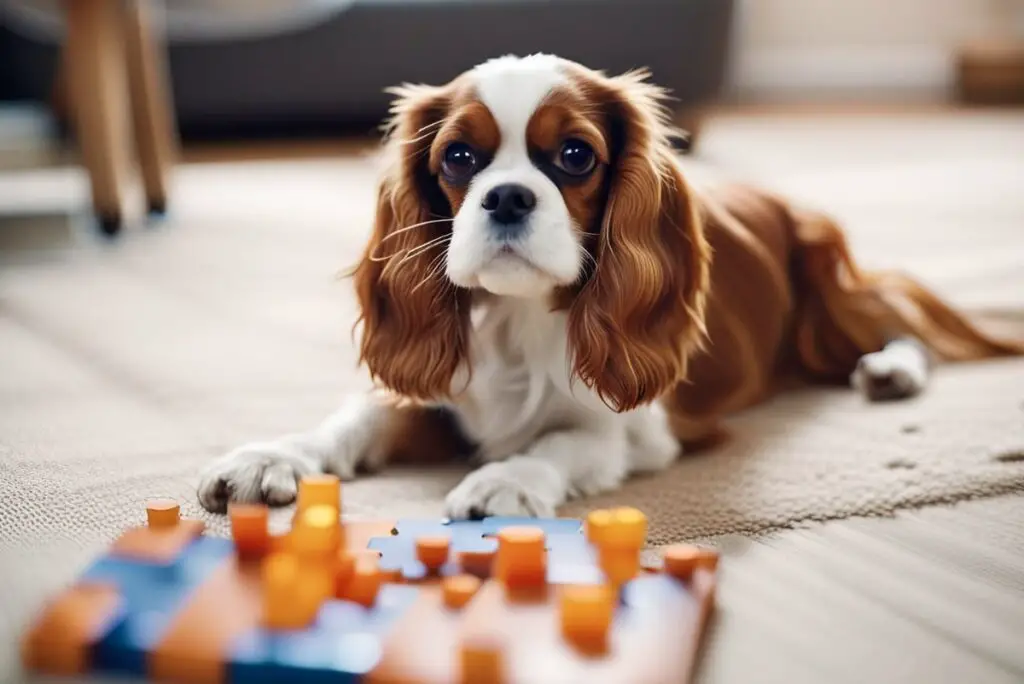
Furthermore, another concerning condition that affects Cavalier King Charles Spaniels is syringomyelia. This neurological disorder arises when fluid-filled cavities form within the spinal cord. It can lead to discomfort, pain, and even paralysis if left untreated. Therefore, owners must be aware of any signs or symptoms of syringomyelia and seek immediate veterinary attention if necessary.
To ensure the overall well-being of your Cavalier King Charles Spaniel and mitigate potential health risks, several essential aspects of their care should be prioritized:
Regular Veterinary Check-ups
Regular visits to the veterinarian are crucial for monitoring your dog’s health and detecting any potential issues early on. Your vet can perform thorough examinations and recommend appropriate preventive measures or treatments tailored to your Cavalier’s needs.
Balanced Diet
A balanced and nutritious diet is essential for maintaining your dog’s health. Cavaliers should be fed high-quality dog food that meets their specific nutritional requirements. Consult with your veterinarian to determine the best diet plan for your furry companion.

Exercise and Mental Stimulation
Cavalier King Charles Spaniels are active dogs requiring regular exercise to keep them physically and mentally stimulated. Daily walks, playtime, and interactive toys can help prevent obesity, promote cardiovascular health, and keep their minds sharp.
Attention to Joint Health
Like many other breeds, Cavaliers are susceptible to hip dysplasia—a condition where the hip joint doesn’t develop correctly. To minimize the risk of this painful condition, it is essential to provide appropriate exercise routines that do not strain their joints excessively.
Compatibility with Children and Other Pets
Cavalier King Charles Spaniels have a temperament that makes them highly compatible with children and other pets. Their gentle nature and friendly disposition make them ideal companions for families.
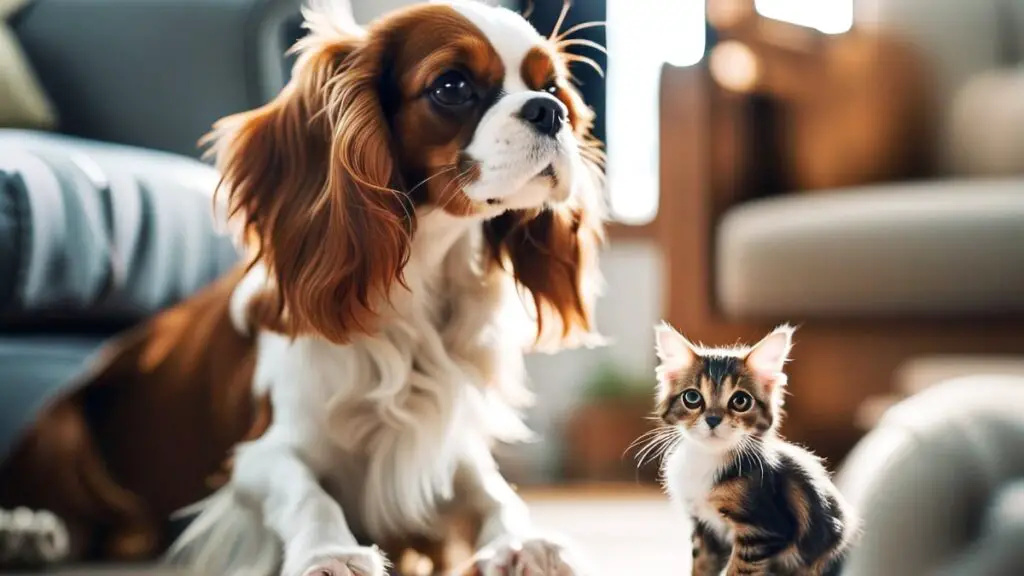
Cavaliers are generally good-natured and patient. They are known for their ability to interact well with kids of all ages, making them an excellent choice for families with young children. These dogs have a natural affinity for people and thrive on the love and attention they receive from their human counterparts. Cavaliers are often seen as little lap dogs, happily snuggling up with their owners or playing games with the kids.
In addition to being great with children, Cavaliers also tend to get along well with other pets in the household. They are friendly animals that enjoy the company of humans and animals alike. While they typically have no issues living harmoniously alongside other dogs, supervision is necessary when introducing them to smaller pets such as cats or rabbits. Due to their hunting instincts, Cavaliers may feel compelled to chase after these smaller animals. However, these tendencies can be minimized with proper training and socialization from an early age.
It’s important to note that while Cavaliers are generally friendly towards other dogs, they may exhibit some prey drive towards smaller breeds or animals due to their history as hunting companions. This doesn’t mean Cavaliers cannot coexist peacefully with small dogs or other pets; instead, it emphasizes the need for careful introductions and ongoing supervision until trust has been established between the animals.
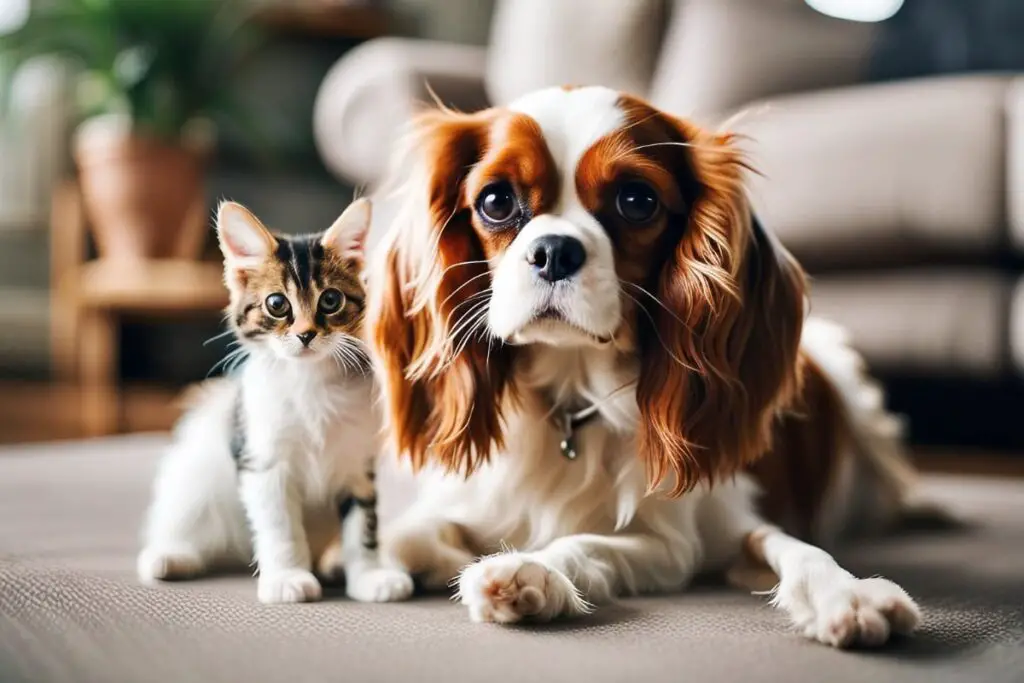
To ensure compatibility between your Cavalier King Charles Spaniel and other pets in your home:
- Gradually introduce your Cavalier puppy or adult dog to any existing pets.
- Always supervise interactions between your Cavalier and smaller animals.
- Provide positive reinforcement training to discourage any chasing behaviors.
- Create separate spaces within your home where each pet can retreat if needed.
- Consider enrolling your Cavalier in dog sports or training classes to reinforce good manners and socialization skills.
Following these guidelines, you can create a harmonious environment where your Cavalier King Charles Spaniel can coexist happily with other pets. Remember, every dog is unique, so it’s essential to observe their behavior and make adjustments to ensure the well-being of all animals involved.
Apartment Living and Exercise Needs
Cavalier King Charles Spaniels are well-suited for apartment living due to their small size. Their compact stature makes them adaptable to smaller spaces, allowing them to thrive in urban environments where larger breeds may struggle. Despite their suitability for apartments, they still have exercise needs to be met to ensure their overall well-being.

Daily exercise is essential for Cavalier King Charles Spaniels, even if they live in an apartment. While they may not require as much physical activity as some high-energy breeds, they still benefit from regular exercise to maintain a healthy weight and prevent behavioral issues that can arise from pent-up energy. Fortunately, meeting their exercise needs can be achieved through various indoor activities.
Indoor play sessions allow Cavaliers to burn off excess energy without requiring large outdoor spaces. Engaging them in interactive games like hide-and-seek or playing with toys can keep them active and entertained within the confines of an apartment. Short walks around the neighborhood or visits to nearby parks allow them to explore new surroundings while getting fresh air and exercise.
In addition to physical activity, mental stimulation is crucial for Cavalier King Charles Spaniels. These intelligent dogs thrive on mental challenges and require activities that keep their minds engaged. Puzzle toys are a great way to provide mental stimulation while saving them from being occupied indoors. These toys often need the dog to figure out how to retrieve treats hidden inside, providing both entertainment and mental exercise.
It’s essential for owners of Cavalier King Charles Spaniels living in apartments to understand their energy levels and cater their exercise routines accordingly. While they are not considered high-energy dogs compared to other breeds, neglecting their need for activity can lead to restlessness or destructive behavior. Regular play sessions and short walks should be incorporated into their daily routine.
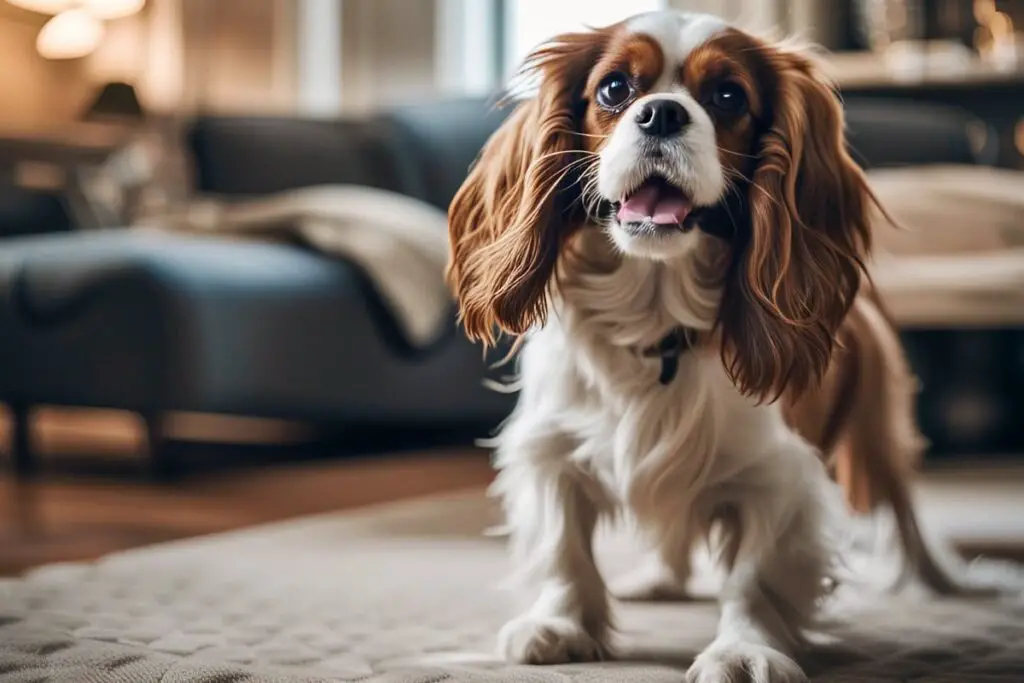
A proper diet is also essential in managing the activity level of these dogs. Providing them with a balanced diet that meets their nutritional needs is crucial for maintaining their energy levels. Consultation with a veterinarian can help determine the appropriate portion sizes and types of food that best suit their needs.
Key Takeaways on Cavalier King Charles Spaniel Temperament
In summary, Cavalier King Charles Spaniels are a charming breed imbued with endearing personality traits, striking appearances, and a friendly temperament that endears them to individuals and families alike. Their caring nature and adaptability to various living conditions make them an excellent choice for many. However, owning a Cavalier entails training, grooming, health care, and exercise responsibilities that shouldn’t be taken lightly. Their heartwarming companionship is a reward worth the effort and care invested in their upbringing. This guide aimed to thoroughly understand these beautiful animals, unraveling the various dimensions of their lives and needs. With responsible breeding, informed care, and abundant love, your relationship with your Cavalier King Charles Spaniel will undoubtedly be a joyous journey filled with affection and mutual companionship.